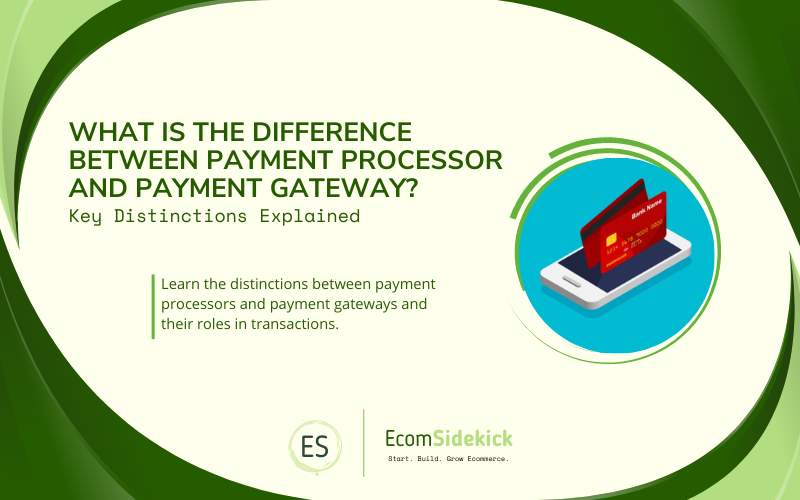Payment processors and gateways are two types of services that allow businesses to accept payments from customers. The understanding of them is critical when you are setting up your business. They differ in their functionality and cost.
So, what is the difference between payment processor and payment gateway?

Payment processing companies provide services such as credit card processing, bank account transfers, and other financial transactions.
Gateways are similar to payment processors, except they also offer additional features such as fraud protection, chargebacks, and merchant accounts.
In this article, we’ll be looking at both payment gateways and processors in turn, then move onto the main differences between the two. So if you’re curious about what either of these are and how they work, read on!
What Is A Payment Gateway?
As you might have guessed from the name, a payment gateway acts as a virtual “gate” that all payments must go through before passing through to payment processing.
In a nutshell, payment gateways are transaction services that help businesses, online retails, and service providers take debit and credit card payments.
If you’re a merchant or online business, it’s worth using a payment gateway service from a reputable company, but bear in mind that brand recognition isn’t the be all and end all when choosing a payment gateway for your business.
It’s highly recommended that any payment gateway service you pick complies with PCI DSS.
What Is A Payment Processor?
As we discussed, a payment gateway acts as a virtual “gate” that a payment goes through. Payment gateways, however, don’t actually process the payment. This is where a payment processor comes in.
A payment processor acts as the mediator between the customer, merchant, acquiring bank, payment gateway, and issuing bank. In this example, the acquiring bank is the merchant’s bank account, and the issuing bank belongs to the customer.
Payment processors are companies or financial institutions selected by the merchant to process online payments. These payments can be made in the traditional sense (by credit or debit card) or alternative payment methods (Alipay, WeChat).
A payment processor will usually act as an intermediary between the customer and the merchant. It will handle the transfer of funds from the customer to the merchant, and then back again to the customer. In addition, it may also handle any refunds or disputes that arise after the transaction has been completed.
The most common reason why merchants use payment processors is because they want to avoid dealing directly with banks when making payments. Banks often impose strict rules on who they do business with, so having a third party involved makes things easier.
What Is The Difference Between Payment Processor And Payment Gateway?

The main differences between these two service providers include:
Payment Processors
These companies specialize in providing payment solutions for merchants. They typically handle the entire transaction process, including customer authentication, authorization, and settlement.
Gateways
These companies focus on providing only the payment gateway function. They usually don’t handle the entire transaction process. Instead, they act as a middleman between the merchant and the acquiring bank.
Fees
Both payment processors and gateways can be expensive. However, it’s important to consider the fees associated with each company before picking one over another.
Features
Payment processors tend to have more advanced features than gateways. For example, many payment processors offer fraud detection tools, which help prevent fraudulent charges.
Support
While both payment processors and gateways offer support, some companies may be better at responding to issues quickly. If you’re having trouble with your payment processor or gateway, make sure you contact them immediately.
Merchant Accounts
Some payment processors require merchants to use their own merchant account. This means that the merchant must open an account with the payment processor first.
Then, the payment processor will work with the acquiring bank to set up the merchant account.
Security
Payment processors and gateways often take steps to ensure security during the transaction process
Is PayPal A Payment Processor Or Gateway?

Now that we’ve established what a payment processor and a payment gateway are, let’s take a look at one of the biggest and well known payment handling companies in the world: PayPal.
With the above in mind, you might be wondering if PayPal is a payment processor or payment gateway. The truth is that it is neither.
PayPal is in fact a payment aggregator, and has its own payment gateway, Payflow. Unlike traditional payment processors, payment aggregators do not require a business to set up a merchant account.
Instead, all transactions go through the same gateway. As such, PayPal does not provide any additional services beyond those provided by other payment gateways.
How Does PayPal Work?
PayPal |
|
When a user buys something from a seller using PayPal, the money goes through the PayPal system. First, the buyer sends his credit card information to the PayPal website.
Once this information is verified, PayPal then connects to the online banking network of the acquirer (the bank where the buyer’s credit card was issued). From there, the acquirer authorizes the charge on behalf of the buyer. Once this happens, PayPal sends the seller the funds.
Final Thoughts
In summary, a payment gateway is a service/tool that all payments go through on a website. It either approves or declines these payments. A payment processor actually executes the transaction.
A payment processor is a third-party entity that processes payments for businesses. It also provides various services like fraud protection, dispute resolution, etc. There are several things to keep in mind when choosing whether to use a payment processor or a gateway.
First, payment processing and gateway companies are very different. One handles the entire transaction process while the other focuses solely on the payment gateway aspect.
Second, both types of companies can be expensive. It’s important to evaluate the fees associated with each type of company before making a decision.
Finally, payment processors tend to have more sophisticated features than gateways. Make sure you know exactly what you need before deciding between the two.
Frequently Asked Questions
What Is a Payment Processor in the Context of Online Payments?
A payment processor is a third-party service provider that handles the technical aspects of transaction processing, securely transmitting payment data between the merchant’s website and the financial institutions involved.
What Is a Payment Gateway, and How Does It Relate to Payment Processing?
A payment gateway is a crucial component of the payment processing system. It acts as the intermediary between the merchant’s website and the payment processor, facilitating the secure transfer of payment data.
What Role Does the Payment Processor Play in the Payment Flow?
The payment processor handles the actual transaction process, including authorizing and capturing funds from the customer’s payment method and settling the transaction with the merchant’s bank.
What Is the Primary Function of a Payment Gateway in Online Transactions?
The payment gateway securely transmits payment data from the customer to the payment processor. It encrypts the data to ensure its security during the transmission process.
Can a Merchant Use a Payment Processor Without a Payment Gateway or Vice Versa?
No, both a payment processor and a payment gateway are typically required to process online payments. The payment gateway acts as the bridge between the merchant’s website and the payment processor.
Paul Martinez is the founder of EcomSidekick.com. He is an expert in the areas of finance, real estate, eCommerce, traffic and conversion.
Join him on EcomSidekick.com to learn how to improve your financial life and excel in these areas. Before starting this media site, Paul built from scratch and managed two multi-million dollar companies. One in the real estate sector and one in the eCommerce sector.


